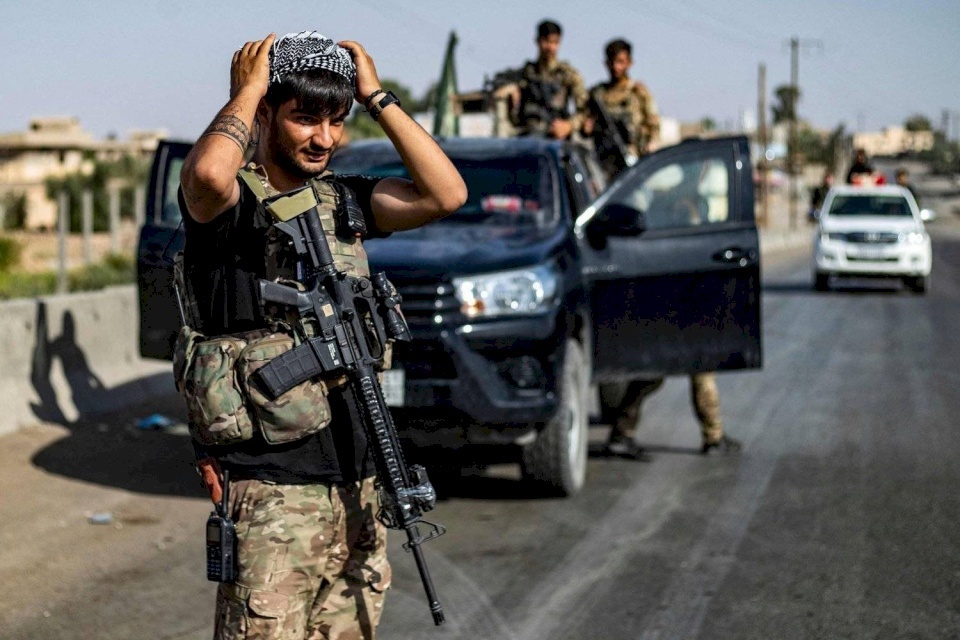
SDF Leader Announces Preliminary Agreement to Integrate SDF into Syrian Defense and Interior Ministries
SadaNews - The leader of the Syrian Democratic Forces (SDF), Mazloum Abdi, announced the reaching of a "preliminary agreement" with the Syrian authorities regarding the mechanism for integrating his forces within the Syrian Ministries of Defense and Interior.
He clarified that talks are currently taking place between the two sides in Damascus.
Abdi and President Ahmad al-Shara signed an agreement on March 10, which included several provisions, primarily the integration of the civilian and military institutions affiliated with the Kurdish self-administration into the national institutions by the end of the year, including the transfer of control over border crossings, an airport, and oil and gas fields to Damascus. However, implementation has been slow amid mutual accusations.
A meeting took place last week in Damascus that included Abdi and al-Shara, attended by U.S. envoy Tom Brauer and the commander of U.S. Central Command in the Middle East, Brad Cooper, as part of Washington's efforts to push the talks forward.
Abdi stated late yesterday, "The new aspect of our recent discussions in Damascus is the shared insistence and strong will to expedite the implementation of the provisions" of the agreement, adding that "the most important point is reaching a preliminary understanding regarding the mechanism of integrating SDF forces and the Kurdish internal security forces within the frameworks of the Ministries of Defense and Interior."
According to Abdi, there are currently military and security delegations from his forces in Damascus to discuss the integration mechanism within the Ministries of Defense and Interior.
The SDF and the security forces, built by the "self-administration" in its areas of influence in northeastern Syria, comprise nearly 100,000 personnel.
Abdi explained, "The SDF will be restructured during its integration within the Ministry of Defense framework" in several formations, and it will have a "new designation" to align with the system followed in the Ministry of Defense, while confirming that the name of his forces will remain a "historical name" after it recorded "heroic epics against ISIS and all aggressors" in the region.
Unity of Syria
In response to a question about Turkey's significant supporting role for the new authority, which was visited by the Syrian Ministers of Defense and Interior yesterday, Abdi confirmed that "any success in the negotiations will certainly depend on Turkey's role," hoping it will play "a supportive and contributing role in the ongoing negotiation process."
For his part, Turkish President Recep Tayyip Erdogan urged the SDF last Wednesday to "adhere to its promises and complete its integration" within the institutions of the new authority.
Turkey has launched several attacks in recent years in northeastern Syria to push Kurdish fighters away from its borders. The Kurdish units leading the SDF have often been labeled a "terrorist organization."
Abdi stated, "We demand a decentralized system in Syria, which has not been accepted so far, and we have not agreed on it," adding, "We are still negotiating to find a common and acceptable formula for everyone."
He emphasized that "the common points we have reached understanding on surpass the points of contention," clarifying, "We agree on the unity of Syrian territory, the unity of national symbols, the independence of political decision in the country, and the fight against terrorism."
He added, "We all agree not to return Syria to the era of wars and to establish stability and security, and I believe these factors are sufficient for us to reach a permanent agreement."
Kurdish Rights
Abdi mentioned that during his last meeting with al-Shara, he demanded "to change or add some provisions to the current constitutional declaration," particularly regarding "guaranteeing the rights of the Kurdish people in the constitution," adding, "There was a response to this matter, and we hope it will happen soon."
Al-Shara praised the role of the United States, in particular, as well as France, as intermediaries in the talks with the transitional authority in Damascus, which is trying to solidify its security grip and launch a reconstruction process.
The Syrian authorities announced on Tuesday the reaching of a "comprehensive ceasefire" with the Kurds in the north and northeast of the country following a meeting that brought together Abdi and al-Shara in Damascus, a day after clashes between government and Kurdish forces in Aleppo that resulted in two deaths.
The announcement of the ceasefire comes at a time when significant disagreements between the transitional authorities and the Kurdish self-administration have delayed the implementation of an agreement reached last March, which included several provisions related to integrating the civil and military institutions of the Kurdish self-administration into national institutions.
Damascus particularly needs to manage some of the major oil and gas fields located in areas controlled by the Kurdish administration.
Abdi stated, "We have not yet discussed the oil file, but it will certainly be addressed in upcoming meetings."
He continued, "We consider the oil and other underground resources found in northeastern Syria to belong to all Syrians, and their revenues and incomes should be distributed fairly among all Syrian provinces."
Source: AFP

International Calls to De-escalate and Warnings of Serious Consequences After Strikes on I...

Syria: 4 Killed in Suwayda Due to Iranian Missile Strike

Moscow: The Attack on Iran is Dangerous and May Lead to Catastrophe

Closure of Airspace and Interception of Iranian Missiles in Gulf States

Lebanon Rejects Involvement in Regional Conflicts

Jordanian Army Announces the Downing of Two Ballistic Missiles Targeting the Kingdom

Two Explosions Rock Jalalabad in Eastern Afghanistan... Pakistan Denies Its Fighter Jet Cr...

